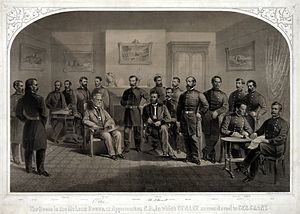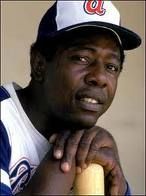Breaking Ruth’s record
Although Aaron himself downplayed the “chase” to surpass Babe Ruth, baseball enthusiasts and the national media grew increasingly excited as he closed in on the home run record. During the summer of 1973 Aaron received thousands of letters every week; the Braves ended up hiring a secretary to help him sort through it.
At the age of 39, Aaron hit 40 home runs in 392 at-bats, ending the season one home run short of the record. He hit home run number 713 on September 29, 1973, and with one day remaining in the season, many expected him to tie the record. But in his final game that year, playing against the Houston Astros (led by manager Leo Durocher, who had once roomed with Babe Ruth), he was unable to achieve this. After the game, Aaron stated that his only fear was that he might not live to see the 1974 season.
Over the winter, Aaron was the recipient of death threats and a large assortment of hate mail from people who did not want to see a black man break Ruth’s nearly sacrosanct home run record. The threats extended to those providing positive press coverage of Aaron. Lewis Grizzard, then editor of the Atlanta Journal, reported receiving numerous phone calls calling them “nigger lovers” for covering Aaron’s chase. While preparing the massive coverage of the home run record, he quietly had an obituary written, scared that Aaron might be murdered.
Sports Illustrated pointedly summarized the racist vitriol that Aaron was forced to endure:
“Is this to be the year in which Aaron, at the age of thirty-nine, takes a moon walk above one of the most hallowed individual records in American sport…? Or will it be remembered as the season in which Aaron, the most dignified of athletes, was besieged with hate mail and trapped by the cobwebs and goblins that lurk in baseball’s attic?”
Aaron received an outpouring of public support in response to the bigotry. Newspaper cartoonist Charles Schulz satirized the anti-Aaron camp in a series of Peanuts strips printed in August 1973, in which Snoopy attempts to break the Ruth record, only to be besieged with hate mail. (As Lucy puts it in the August 11 strip, “Hank Aaron is a great player…but you! If you break Babe Ruth’s record, it’ll be a disgrace!”) Babe Ruth’s widow, Claire Hodgson, even denounced the racism and declared that her husband would have enthusiastically cheered Aaron’s attempt at the record. Ruth, who was unprejudiced, had himself been subjected to racial taunts during his youth, by those who fancied that he had Negroid features.
 As the 1974 season began, Aaron’s pursuit of the record caused a small controversy. The Braves opened the season on the road in Cincinnati with a three-game series against the Cincinnati Reds. Braves management wanted him to break the record in Atlanta, and were therefore going to have Aaron sit out the first three games of the season. But Baseball Commissioner Bowie Kuhn ruled that he had to play two games in the first series. He played two out of three, tying Babe Ruth’s record in his very first at bat off Reds pitcher Jack Billingham, but did not hit another home run in the series.
As the 1974 season began, Aaron’s pursuit of the record caused a small controversy. The Braves opened the season on the road in Cincinnati with a three-game series against the Cincinnati Reds. Braves management wanted him to break the record in Atlanta, and were therefore going to have Aaron sit out the first three games of the season. But Baseball Commissioner Bowie Kuhn ruled that he had to play two games in the first series. He played two out of three, tying Babe Ruth’s record in his very first at bat off Reds pitcher Jack Billingham, but did not hit another home run in the series.
The team returned to Atlanta, and on April 8, 1974, a crowd of 53,775 people showed up for the game-a Braves attendance record. In the fourth inning, Aaron hit career home run number 715 off Los Angeles Dodgers pitcher Al Downing. Although Dodgers outfielder Bill Buckner nearly went over the outfield wall trying to catch it, the ball landed in the Braves’ bullpen, where relief pitcher Tom House caught it. While cannons were fired in celebration, two white college students, Cliff Courtney and Britt Gaston, sprinted onto the field and jogged alongside Aaron for part of his circuit around the bases, temporarily startling him. As the fans cheered wildly, Aaron’s parents ran onto the field as well.
Dodgers broadcaster Vin Scully addressed the racial tension – or apparent lack thereof – in his call of the home run:
“What a marvelous moment for baseball; what a marvelous moment for Atlanta and the state of Georgia; what a marvelous moment for the country and the world. A black man is getting a standing ovation in the Deep South for breaking a record of an all-time baseball idol. And it is a great moment for all of us, and particularly for Henry Aaron. … And for the first time in a long time, that poker face in Aaron shows the tremendous strain and relief of what it must have been like to live with for the past several months.”
A few months later, on October 5, 1974, Aaron hit his 733rd and final home run as a Brave, which stood as the National League’s home run record until it was broken in 2007. Thirty days later, the Braves traded Aaron to the Milwaukee Brewers for Roger Alexander and Dave May. On May 1, 1975, Aaron broke baseball’s all-time RBI record, previously held by Ruth with 2,217. That year, he also made the last of his 21 record-tying (with Musial and Mays) All-Star appearances; he lined out to Dave Concepcion as a pinch-hitter in the second inning. This All-Star game, like his first in 1955, was before a home crowd at Milwaukee County Stadium.
On July 20, 1976, Hank Aaron hit his 755th and final home run at Milwaukee County Stadium off Dick Drago of the California Angels.
On this day in 1961, aboard the spacecraft Vostok 1, Soviet cosmonaut Yuri Alekseyevich Gagarin becomes the first human being to travel into space. During the flight, the 27-year-old test pilot and industrial technician also became the first man to orbit the planet, a feat accomplished by his space capsule in 89 minutes. Vostok 1 orbited Earth at a maximum altitude of 187 miles and was guided entirely by an automatic control system. The only statement attributed to Gagarin during his one hour and 48 minutes in space was, “Flight is proceeding normally; I am well.”




 Welcome to the
Welcome to the 
 On this day in 1974,
On this day in 1974,  As the 1974 season began, Aaron’s pursuit of the record caused a small controversy. The Braves opened the season on the road in Cincinnati with a three-game series against the
As the 1974 season began, Aaron’s pursuit of the record caused a small controversy. The Braves opened the season on the road in Cincinnati with a three-game series against the